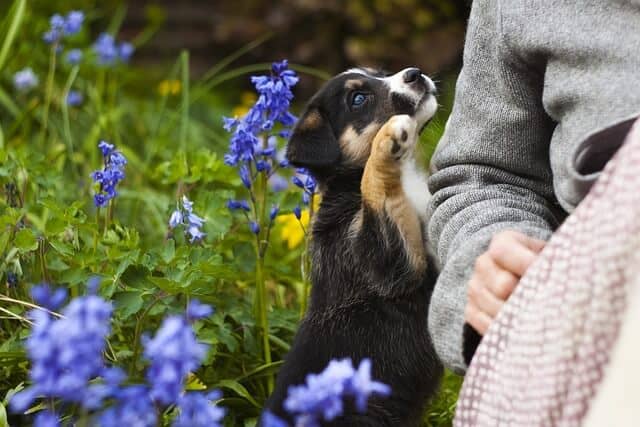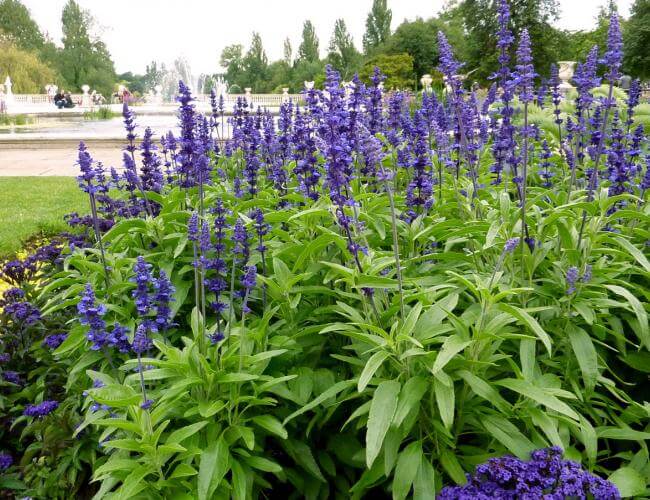Are you thinking of sprucing up your kitchen garden with a variety or two of salvias? There are plenty of reasons why you should…
Salvias are hardy, beautiful, and long-blooming. They come in endless color variations and are sure to give your garden the much-needed awakening.
Whether you want a welcoming vibe, a warmer environment, or an aesthetically pleasing home, you can trust the magic of salvias to do that.
Nevertheless, as a pet parent, anything that poses a threat to your pet is simply not welcome in your space.
Your animal friend is just that important and deserves your protection.
Salvias may be cute and all but if they are not safe around dogs, they are useless to you.
Before you plant any salvia species in your garden, find out if it is dog-friendly or not.
We have done the research for you and came up with this useful guide.
Let’s dive right in…
What Are Salvias?
The term “salvia” refers to a genus of plants comprising perennials, annuals, and shrubs.
The genus has approximately 1,000 species many of which are known simply as sage.
The species are part of the mint family and thus have a strong pungent smell that bees, hummingbirds, and butterflies find very attractive.
Other common plants in the mint family include lavender, rosemary, basil, and thyme.
Most Salvia species are perennials that bring color and form in the early summer months.
However, the annuals are also popular in colder regions. The plants are beloved for their color and long bloom period that typically lasts from spring into fall.
Salvia flowers bloom in spikes of different colors such as blue, lavender, dark purple, pink, red, yellow, and white.
The stems are square with narrow velvet green leaves.
If you are looking for some pop of color in your garden, you can trust salvias to make your dream come true.
But are they safe for your pooch?
Are Salvias Poisonous To Dogs?

Salvia genus as a whole is not listed anywhere as being toxic or non-toxic to dogs.
However, according to the ASPCA’s list, common sage whose scientific name is Salvia officinalis is listed as non-toxic to dogs.
Other safer salvia species include Salvia greggi or the Autumn Sage, SaLviafarinacea or Mealycup Sage, Salvia Coccinea or Blood Sage, and Salvia sylvestris or May Night Sage.
This, however, doesn’t prove that the entire family of salvias isn’t poisonous to your dog.
Other varieties such as Red Sage and saucy Red Salvia (Salvia splendens) may have some toxicity in them albeit in slight amounts.
If a dog ingests them in a large quantity, they can turn toxic.
It especially triggers hemorrhaging in your canine friend which is quite hard to know.
Thankfully, Red Sage is not attractive to dogs for some reason. They’d rather play and roll over other types of plants and herbs than be around them.
Still, accidental ingestion is a possibility.
So, if you have this specific specie of Salvia in your garden, be sure to keep it out of reach of your dog.
My Dog Ate Salvias: What Should I Do?

As mentioned before, not all salvias are poisonous to your dog.
So far, only red sage seems to be the only variety with the potential to hurt him.
Most of the salvia species available in many of our gardens do not pose any health risk to your pet.
All the same, if you happen to plan red sage, your dog may ingest enough of it to cause hemorrhaging.
Since this is a very difficult sign to deduce, you should rush your dog to the vet when you suspect that he’s taken red sage.
This should happen immediately after you catch him in the act or smell the sage in his mouth.
The vet will carry out tests and determine whether the dog is in danger or not.
More often than not, a dog cannot consume enough red sage to cause fatal issues but as a responsible pet parent, always err on the side of caution.
Parting Thoughts
Are salvias poisonous to dogs? Yes and no.
It all depends on the actual variety in question.
Many of the common varieties we plant in our gardens are safe for your doggie.
However, a few of them including red sage can be dangerous if ingested in huge amounts.
If your dog eats some, seek medical help immediately.
As an Amazon Associate, we may receive a small commission from qualifying purchases but at no extra cost to you. Learn more. Amazon and the Amazon logo are trademarks of Amazon.com, Inc, or its affiliates.

